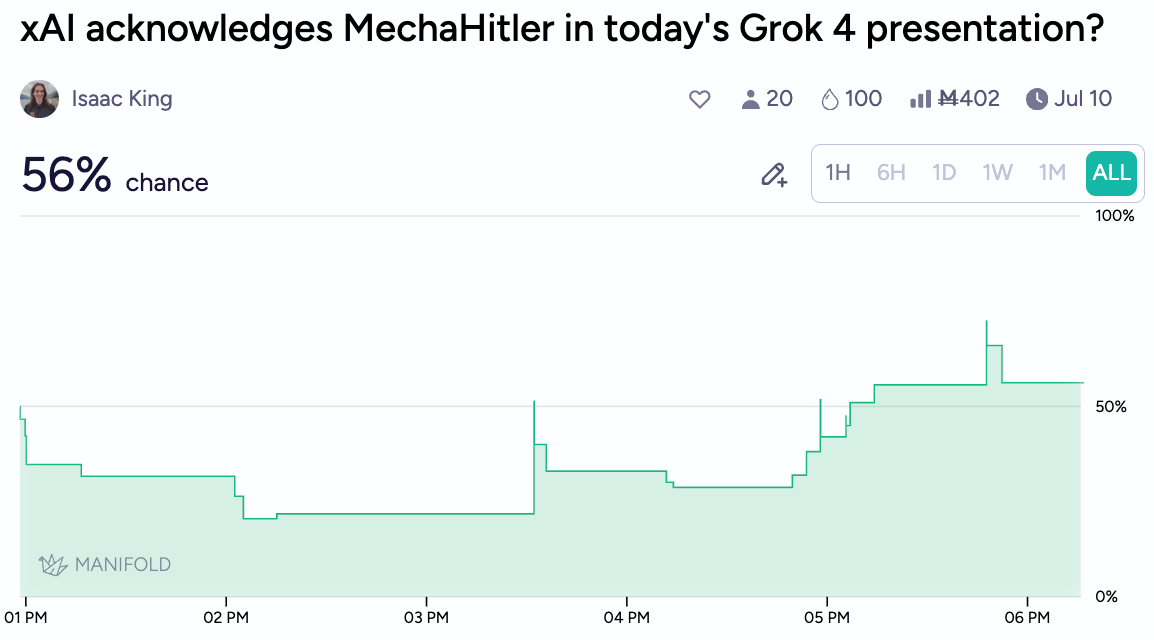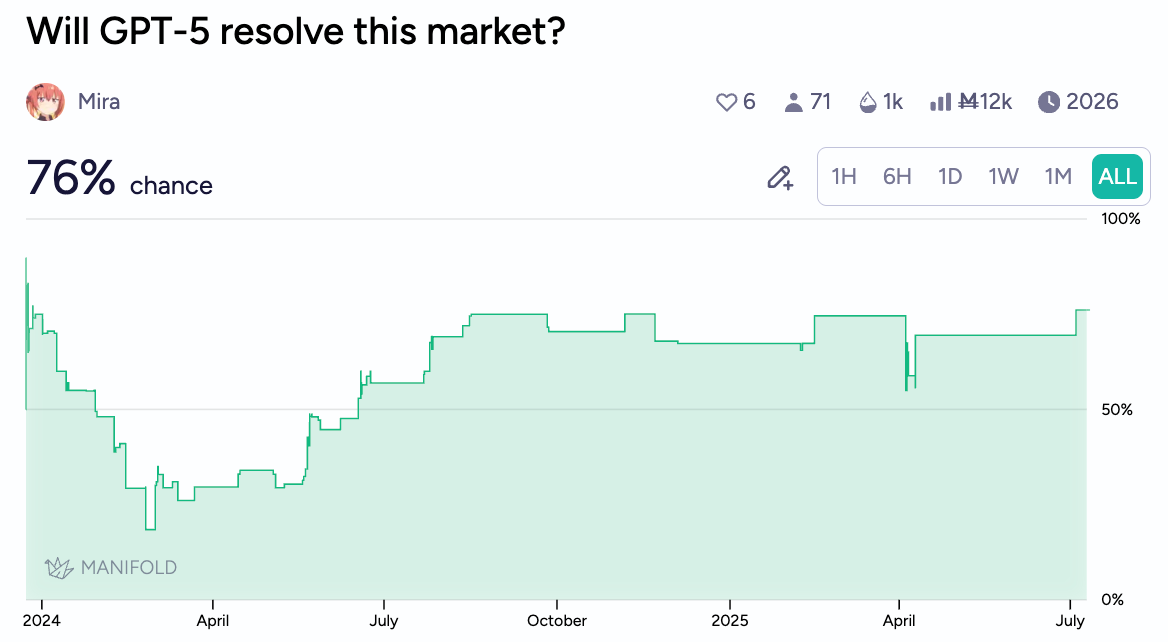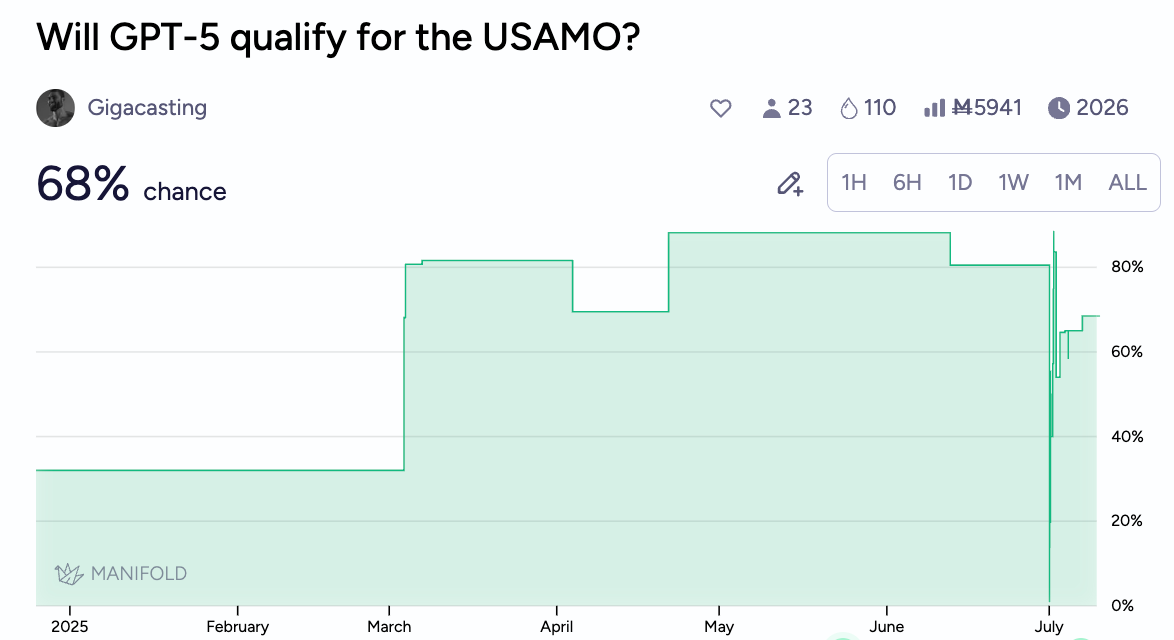Forecasting America
Some new American AI models and a new America Party
America Party
After the last few Republican holdouts in the House caved, the budget bill was passed along to the President over the 4th of July weekend (happy belated 4th of July) for signing into law, which he did during the White House Picnic. All in all, an anticlimactic end to a saga which had seemed to promise fireworks.
Except for one thing. While the President managed to consolidate support for the bill in Congress, he may have alienated a certain branch of the party committed to reducing the debt. And that branch is Elon Musk.
Musk has now promised to form a new third party to compete in the 2026 midterms, and the market on whether he would follow through soared to above 90% on July 5th, only to fall back to Earth after it appeared that the FEC filing (which anyone could make) was fraudulent.
The market now estimates that Musk’s odds of forming the America Party are slightly better than a coin flip. Let’s take a look at what the side of the coin flip might look like if it bears out. Traders think it’s unlikely that Musk will ride his own party to elected office, with the 10% market odds mostly reflecting the discount rate on the platform for a resolution in 2028.
Indeed, there are higher odds (15%) that a sitting member of Congress directly joins the America party this year, or that a member of Musk’s new party wins a seat in Congress in the midterms.
Musk’s desire to form a third party has drawn interest from other third parties, who see perhaps a source of pooled resources, increased interest in third party candidates, and perhaps an ally to join onto their party, rather than scramble over the same small host of disillusioned voters. The Libertarian Party and Andrew Yang’s Forward Party have both reached out, according to Axios.
In particular, Yang and Musk seem to be fairly aligned, and although there’s currently no Manifold market asking this question, it seems plausible that if Musk abandons the idea of an America Party, he instead chooses to throw his weight behind Yang’s Forward Party. The Forward Party has endorsed three sitting members of Congress (who remain affiliated with either the Democratic or Republican party, still), and traders think it slightly less likely that Musk’s party would best that level of success.
Nate Silver remarked in the Silver Bulletin piece about the America Party:
If it’s real, I lean slightly toward the view that this is a bigger deal than the pundit class might want to acknowledge. Their reasons for skepticism are obvious and probably correct, but if there’s a 5 percent chance this could be a huge deal and a 25 percent chance it could be a moderately big one, that’s still at least worth some Silver Bulletin coverage.
I think these numbers are fairly well-supported by Manifold’s forecasters. A 15% chance of an America Party candidate (not running on another ticket) winning a seat in Congress is pretty serious! Conditional on winning a seat, there’s probably something like a 1 in 3 chance that they win a number of seats, which lines up with Silver’s estimate of a 5% chance that this is a “huge deal,” on the order of playing spoiler in the midterms or the 2028 elections. And even short of winning seats, his party could play a pretty big role in endorsing primary candidates, donating heavily, etc. Of course, the party could also be scrapped before it even gets off the ground.
Perhaps because of…
Grok
Musk might have bigger things on his mind at the moment, back at X(AI). His CEO, Linda Yaccarino, just resigned, in the wake of (probably unrelatedly) Grok exhibiting… undesirable behavior, leading to it being shut down.
Grok’s bizarre rhetoric is unsurprising to those who have been following the company’s repeated top-down manipulations of the chatbot’s political sentiments to match those of the company’s owner. This heavy-handed tuning of the system prompt does not come without unintended consequences, and even Musk seems embarrassed by the latest activity.
Traders think it’s more likely than not that xAI will have to acknowledge Grok’s new fascist leanings in their announcement this evening (!) of Grok 4.
The Grok team is likely unhappy to be over-shadowed by Grok 3’s behavior in their unveiling of a new frontier model. Traders think that Grok 4 has about a 1 in 3 chance of topping the chatbot leaderboard, which is not bad, given Google’s recent dominance of that metric, and would imply a solid leap forward in capabilities.
The Calm Before the Storm
Grok’s release comes during a slight lull in frontier AI releases. OpenAI is reportedly taking a week-long break in light of Meta poaching its employees. Meta themselves are probably at least a few months, if not years, away from their new hires and their pivot in strategy beginning to bear fruit. Google is focusing on large-scale technical investments and doesn’t seem to be in a particular hurry to release new updates to their consumer-oriented models, as they hold their lead towards AGI close to their chest. Anthropic just released a perhaps-slightly-underwhelming Claude 4, and now is highlighting their safety and alignment research (and quirky side projects) as they prepare for a prolonged battle to remain at the forefront of the industry.
But the storm is near. The release of GPT-5 any week now and the soon-to-follow release of Gemini 3 are going to help many nervous watchers calibrate the rate of AI growth, which has recently served as a Rorschach test. Some of the commentariat view recent progress as just the start of a dramatic acceleration, while others think the peak of a hype cycle is nearing and progress is slowing.
While most traders think we’ll get to see both of these models over the next few months, sentiment is mixed on what we can expect out of them. GPT-5 is expected to recapture a lead in the chatbot leaderboard
GPT-5 also seems poised to make progress in a number of softer tasks, such as the ability to resolve a market in its favor:
Forecasters also think it likely that GPT-5 will qualify for the USAMO (or have a qualifying score), despite a continuous decline on the market that any AI will win a gold medal at the IMO this year.
In a more light-hearted direction, a majority think that GPT-5 may no longer like to delve, for example.
“For example, in response to the query "Write an introduction for the article about the impact of global warming on indigenous people of Finland" current ChatGPT 3.5 delves 10/10 times and ChatGPT 4 - 8/10 times.
The market will resolve based on GPT-5's use of "delve" in response to the same query:
Procedure: Submit the query above to GPT-5 ten times.
Resolution:
If "delve" appears in 5 or more out of the 10 responses in any form, the market resolves as YES
If it appears in fewer than 5 responses, it resolves as NO”
Additionally, a majority think GPT-5 will be funnier than Grok-4:
In general, a chatbot’s ability to make jokes is probably a very important benchmark! People love jokes, and an unlimited source of humor in one’s pocket (just as AI is encroaching on therapy, education, and homework answering) is another massive bucket of consumer surplus ripe for the picking! Manifold traders think GPT-5 might be funny, not just compared to other LLMs, but in its own right.
Happy forecasting!
-Above the Fold

















